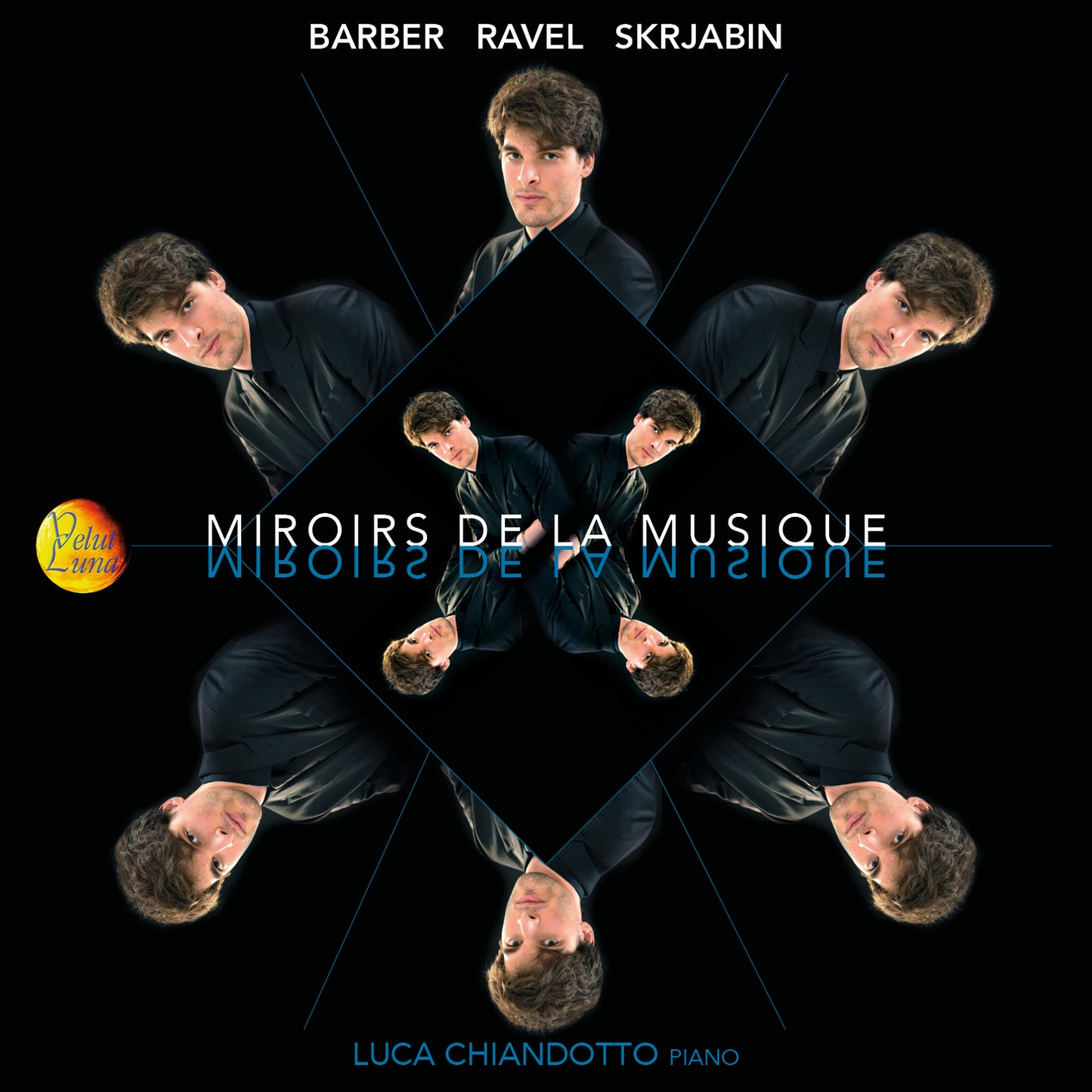Velut Luna
Miroirs de la musique - Luca Chiandotto
Miroirs de la musique - Luca Chiandotto
Genere musicale:
Disponibile
Impossibile caricare la disponibilità di ritiro
Miroirs de la musique (CVLD344)
Luca Chiandotto, piano
Disponibile in: File HD, CD
Aleksandr Nikolaevič Skrjabin (1872 – 1915)
01 - Poème op. 72 Vers la flamme (1914) 5:36
Maurice Ravel (1875 – 1937)
Miroirs (1905) 30:04
02 - Noctuelles 5:23
03 - Oiseaux tristes 4:33
04 - Une barque sur l’océan 7:05
05 - Alborada del gracioso 6:52
06 - La vallée des cloches 6:11
Samuel Barber (1910 – 1981)
Sonata in Mi bemolle minore op. 26 (1949) 21:10
07 - Allegro energico 7:30
08 - Allegro vivace e leggero 2:26
09 - Adagio mesto 5:58
10 - Fuga: Allegro con spirito 5:16
Total Time: 56:56
24 bit / 88.2 kHz original recording, made at Magister Recording Area, Preganziol (Italy), on October 8, 9, 10, 2021
Luca plays on Steinway & Sons D274 Concert Grandpiano, tuned and prepared by Silvano Zanta
Production: VELUT LUNA
Executive Producer: Marco Lincetto
Recording, mix and mastering engineer: Marco Lincetto
Musical producer and editing: Mattia Zanatta
Design: L'Image
Photo: Photoservice Latisana
Mysterium, un’opera ambiziosa, portatrice dell’idea rivoluzionaria dell’unione sinestetica dei cinque sensi. Alla sua realizzazione – da ambientarsi ai piedi dell’Himalaya - occorrono una grande orchestra, un coro misto, ballerini, incensi ed effetti luminosi. Il fine ultimo è l’evoluzione spirituale dei fruitori di questa opera immensa, in linea con l’estetica tardoromantica. Skrjabin lavora per anni a questo progetto senza precedenti - seppur debitore della Gesamtkunstwerk wagneriana - lasciandolo incompiuto con la sua morte. Ed è in questo contesto che trova la luce Vers la flamme, un poema in cui la voce del fuoco è protagonista, dall’inizio in cui arde sotto le braci, sotterraneo e magmatico, al crepitare sempre più intenso e bramoso, sino al finale in cui si espande incontrollato, bruciando tutto ciò che lo circonda. La conclusione estatica è di impronta skrjabiniana, e ricorda quel senso di liberazione che il compositore brama con il Mysterium.
Volto francese e titolo della presente produzione, incentrata sul Primo Novecento pianistico, è la Suite Miroirs di Ravel. È composta da cinque episodi, di cui ognuno ritrae un soggetto diverso, osservato attraverso uno specchio. Il musicista fu infatti ispirato da un verso del Giulio Cesare di Shakespeare: “L’occhio non vede se stesso che per riflesso, attraverso altre cose.”
La Sonata di Barber si può definire una “Sonata di guerra”, scritta solo quattro anni dopo la fine del secondo conflitto mondiale, e caratterizzata da esplicita violenza, soprattutto nei movimenti di apertura e chiusura. L’allegro energico si delinea in un’azione imperante e volitiva, quasi opprimente, del primo tema, che si oppone al passivo lamento del secondo. Si può constatare già dal primo movimento come la Sonata aderisca ai modelli formali classici, in questo caso, alla forma-sonata. L’allegro vivace e leggero, dall’atmosfera grottesca, contiene frammenti di danza, probabilmente un valzer, che conferiscono un carattere falsamente spensierato e incurante. Il cuore espressivo della sonata risiede nel terzo movimento, l’adagio mesto, che sviluppa un canto estremamente tormentato e straziato; nella seconda pagina dello spartito, possiamo assistere ad una perfetta imitazione di un pianto angosciato, che evolve in un climax tremendamente sopraffatto dalla ragione. Tra le dissonanze di nona minore e settima maggiore, si giunge alla quiete finale, un insperatissimo accordo di si minore, provvisoria pace prima del quarto movimento. La fuga finale a quattro voci è celebre nelle sale da concerto, e unisce il dramma dei movimenti precedenti a ritmi in controtempo molto caratteristici e ad armonie di derivazione jazzistica. Sorprendente è la spensieratezza dei divertimenti nella sezione centrale, ancora di più il ritorno all’angoscia nello stretto finale, in cui i bassi poderosi sono tamburi infernali che sanciscono la tragicità che si era palesata sin dalle prime note della sonata.
Share

-

Spedizioni prodotti fisici
Spedizioni gratuite in Europa (UE), a partire da 4 articoli - Richiedere quatozione per i costi di spedizione per i paesi non UE
-

Consegna prodotti digitali
La consegna dei prodotti digitali avverrà direttamente sul sito e riceverai anche una email con il link per il download dei file.
-

Scrivi una recensione
Qui sopra puoi scrivere una recensione sul prodotto che hai acquistato, saremo felici di conoscere la tua opinione.


